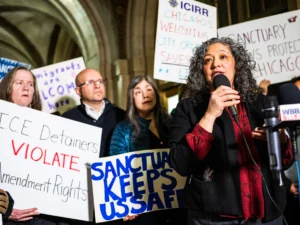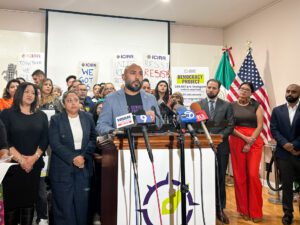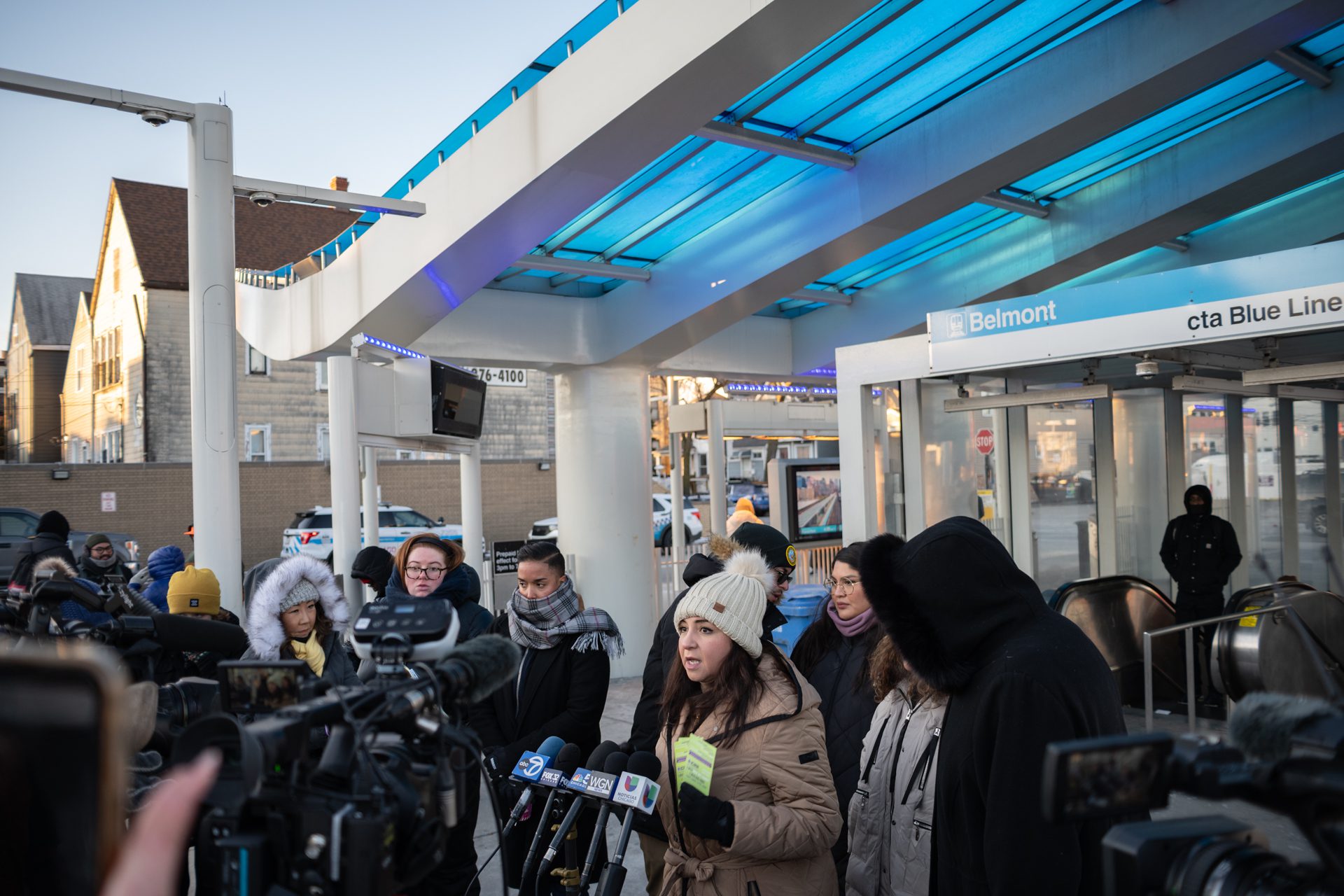 Max Herman/Borderless Magazine
Max Herman/Borderless MagazineOn the eve of his inauguration, Donald Trump’s plans to step up ICE raids and seal the border drummed up worries across Chicago.
As Donald Trump prepared to be sworn in as the 47th president of the United States Monday morning, U.S. Rep. Delia Ramirez stood outside a train station 600 miles away, distributing Know Your Rights flyers in Chicago’s Avondale neighborhood.
Her efforts in the bitter cold come after weeks of work alongside other elected officials and organizers to prepare and empower local immigrants with critical information in anticipation of Trump’s presidency.
“[We are] reminding people that [at] every single level of government here in Chicago — a ‘Welcoming City’ — we will do everything in our power to make sure that people know what their rights are and people also know where to seek resources,” Ramirez said.
News that puts power under the spotlight and communities at the center.
Sign up for our free newsletter and get updates twice a week.
Chicago is home to 1.7 million immigrants, representing about 20% of the city’s population. Even before being sworn into office, Trump’s plans for widespread deportations on the streets of Chicago and changes to the immigration system stirred anxiety inside homes, schools, churches, grocery stores, workplaces, and just about every corner of social media, influencing how people maneuver under a new administration that has put immigration policies in its crosshairs.
Across Chicago, elected officials and immigrant serving groups have been on alert, working to combat the thing Trump has long employed in his political toolbox: fear.
Some of the city’s immigrant communities are waking up and making decisions on whether they stay home amid the threats of raids that harken back to similar threats from Trump’s first term.
“Do I stay home, or do I show up?” Ramirez said. “But the reality is that many of our families, [and] individuals don’t have the privilege of not going to work. They can’t miss a day. They will get fired. They might not have a sick day, or they have to pay the rent.”
People are leaving their homes with “some fear,” she said.
Trump’s Second Term
Following the election, Tom Homan, the former acting director of U.S. Immigration and Customs Enforcement — and Trump’s handpicked border czar threatened to start mass deportations in Chicago. The threat fell in line with Trump’s campaign rhetoric, where he promised to enact sweeping deportations of people who have entered the country without authorization. He pledged to invoke the Alien Enemies Act of 1798 to pursue “Operation Aurora,” an effort that would deport immigrants with criminal convictions and without permanent legal status.
The Alien Enemies Act has only been used three other times in U.S. history — during the War of 1812, World War I, and World War II. The centuries-old law allows a president to detain, relocate, or deport noncitizens from a country considered an ‘enemy’ of the U.S. during wartime. Trump has promised to use the U.S. military to carry out mass deportations, an action that would likely face legal hurdles and logistical challenges.
Last week, reports surfaced of widespread immigration enforcement actions kicking off in Chicago as early as Tuesday. But after “Operation Safeguard” was leaked to the press, the administration is reportedly postponing those efforts, which would have seen 150 to 200 agents descend on Chicago as early as Tuesday.
In an interview with the Washington Post, Homan said the administration hasn’t decided on post-inauguration raids, which would be broad in scope.
“It’s unfortunate because anyone leaking law enforcement operations puts officers at greater risk,” Homan told the Washington Post.
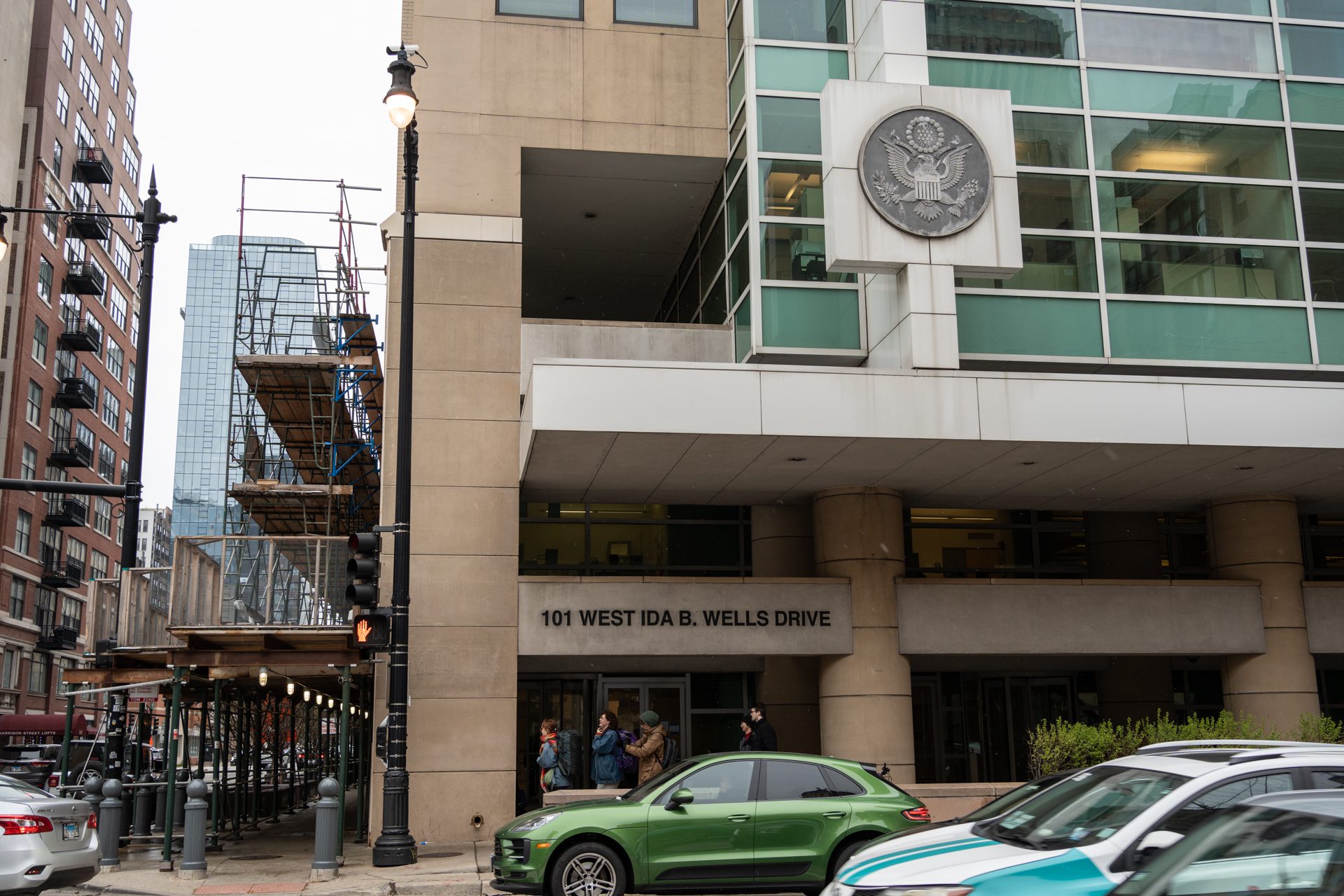
While the timeline for Trump’s actions remains unclear, his administration looks to sign a flurry of executive orders in the first 100 days. Among his first actions, Trump signed executive orders to end birthright citizenship, task the armed forces with border enforcement, and re-introduce the remain in Mexico policy for refugees and asylum seekers.
These executive orders come at a time of declining border crossings. After former President Joe Biden cracked down on asylum seekers with an executive order in June 2024, border crossings approached the lowest level since July 2020. Trump’s planned executive orders also come after he took credit for tanking a bipartisan border law that would have increased border patrol agents and funded more of the border wall.
The latest immigration raid threats harken back to Trump’s first presidency. In 2019, he directed federal agents to step up enforcement and remove 2,000 migrant families facing deportation orders in Chicago and other major cities.
Following the threats, some Little Village businesses on 26th Street — the city’s second-highest-grossing shopping district and port of entry for Mexican families — saw a 50% drop in sales, according to Block Club Chicago.
“When these threats happen, there isn’t a soul on 26th Street,” business owner Adolfo Peña told Block Club at the time. “It causes panic and does a lot of harm to the economy of the neighborhood, to Chicago and the state.”
Read More of Our Coverage
Syracuse University Professor and Researcher Austin Kocher said the perception that federal or local officers are engaging in immigration enforcement can significantly shape people’s behaviors, whether or not agencies follow through on those promises.
Kocher and other researchers have seen immigrants changing their everyday driving and transportation behaviors out of fear of encountering law enforcement officials.
The rhetoric, the fear and the perception that the current administration is going to be tough on immigration enforcement is itself enough to evoke measurable behavior changes among immigrants, whether they are documented or undocumented, Kocher said.
“Immigrants perceive themselves as targeted whether they have legal status or not,” Kocher said. “Simply, their identity is often enough to respond with behavioral changes.”
“Fear Is The Most Powerful Weapon You Can Imagine”
That fear has already permeated communities and settled into reality even in sanctuary cities like Chicago.
In the days since the election, Veronica has felt worries envelop her community with Trump’s victory. She asked for her last name to be withheld because of Trump’s deportation threats.
“There are also many people who are very afraid of what might happen,” Veronica told Borderless Magazine. “I am also afraid of what might happen.”
She arrived in Chicago from Mexico more than two decades ago. Like many immigrants, she came looking for work. “My whole life has been work,” she said. “I’ve never asked for any assistance from the government. I’ve always done it on my own.”
Illinois is home to 467,400 undocumented immigrants, the majority of whom have lived in the United States for more than five years, according to data from the American Immigration Council. As a group, they pay $4.2 billion in state, local and federal taxes.
“People like us do not receive any benefits, but we support the country,” Veronica said. “We never complain. We’ve always been working.”
Even after Veronica lost her job and health insurance during the pandemic, she had to find a way forward for her family. Now, she and others who are undocumented are staring at renewed threats of deportation.
“I think there is a lot of uncertainty about how this government is going to work, and there are also many people who are very afraid of what might happen,” Veronica said.
She’s had many sleepless nights just thinking about that uncertainty since reports came out of raids planned in Chicago.
“Fear is the most powerful weapon you can imagine,” she said.
Read More of Our Coverage
Outside the Chicago Blue Line station on Monday, Ramirez saw firsthand how fear is already playing out and changing the way of life for immigrant communities.
“A moment ago, I talked to a gentleman who… said to me: ‘I have papers I can show you,’ and he pulled out his Green Card authorization card.”
“This is the fear that people are living,” Ramirez said. “I said to him, ‘You don’t have to show that.’”
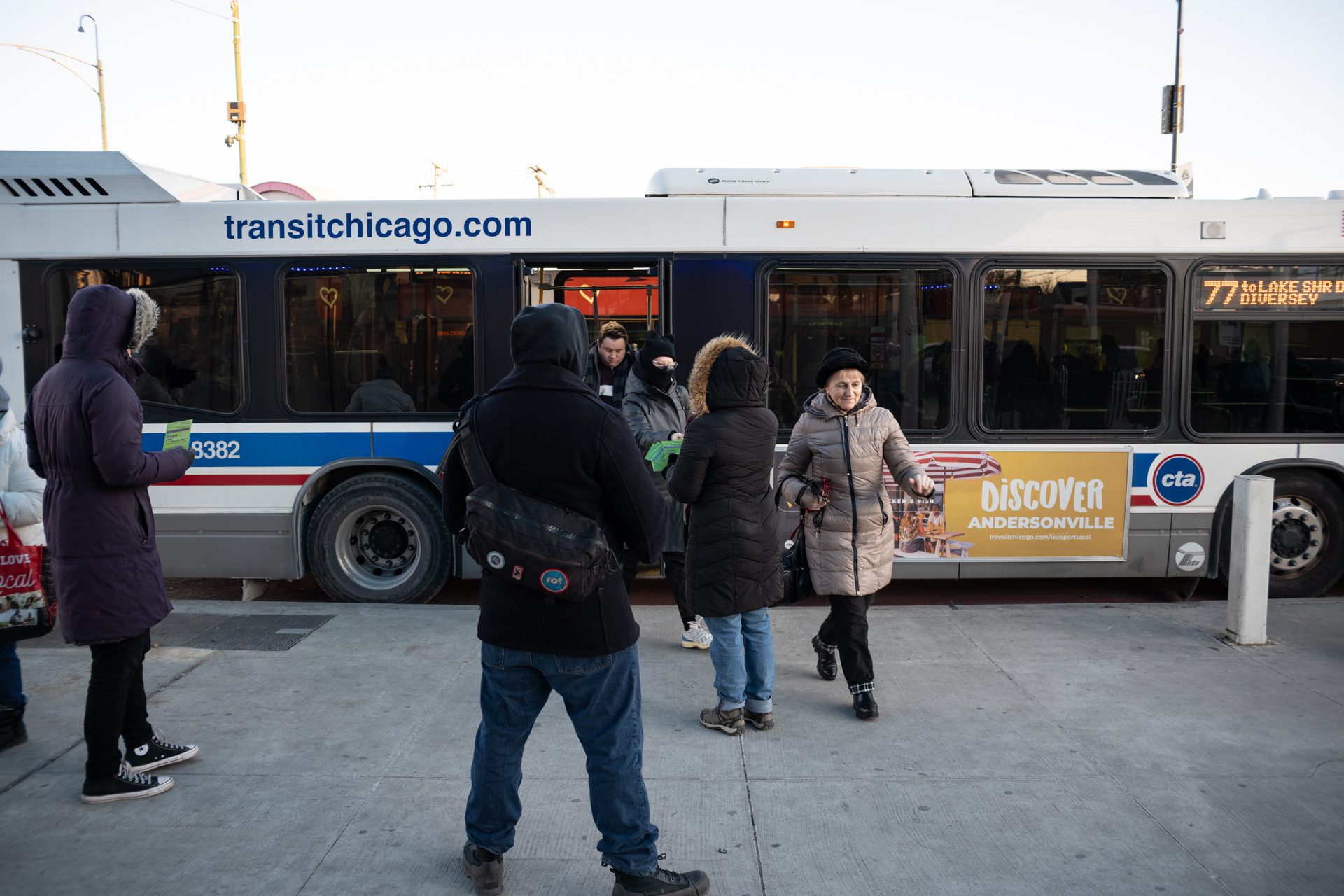
State Sen. Graciela Guzmán knows that fear is top of mind for family, friends and neighbors. That’s why elected officials, community groups and organizers have worked for weeks to prepare to disrupt some of the deportation actions in Chicago.
“We activated an anti-deportation working group, working on Know Your Rights and rebuild those bonds so…should ICE [follow through] with its promise, we will be ready to go,” Guzmán said. At every level of government, “we are going to be protecting our people.”
Ald. Rossana Rodriguez-Sanchez (33rd) said volunteers have been passing out Know Your Rights flyers at laundromats, grocery stores, train and bus stops, and other high-traffic places and community hubs to meet people where they are. She told Borderless Magazine that such places and community hubs should have information readily available.
The alder said the onus should not just fall on immigrants without citizenship — who represent about half of the city’s immigrant population — to know this. She recommends that people who are citizens also learn how to recognize immigration officers and know what to do if they witness an ICE action.
“It should be accessible to everyone, everywhere,” Rodriguez-Sanchez said. “We should continue doing this over the coming months.”
“We Should Not Let Fear Win In This Moment”
As a sanctuary city, Chicago prohibits police from cooperating with federal immigration agents. Those protections recently faced some challenges.
In Sept. 2023, a measure introduced by Ald. Raymond Lopez (15th) and Ald. Silvana Tabares (23rd) sought to reinstate the ability of local law enforcement agencies to collaborate with federal agents on cases where individuals are arrested for drug and gang-related activities. The measure was blocked in City Council last week, effectively upholding those protections.
Ald. Lopez expressed disappointment at the outcome, saying, “What worried my colleague and I the most is the fact that we know that the federal government will continue to come into our communities looking for high-priority targets, and there will be collateral captures taken by ICE because we are basically saying, ‘Go find them yourself.’”

In 2019, Ald. Lopez previously criticized federal agents for “manipulating” and attempting to drag police officers into deportation operations, according to a Block Club and the Daily Line report.
“We want to make sure this is not part of a larger pattern to forcibly bring CPD, even though we will not actively engage in ICE deportation,” he told Block Club and the Daily Line at the time.
Ald. Jesse Fuentes (26th), who introduced the measure to block the changes, said a majority of alders agreed and didn’t feel a discussion on the amendment was productive, especially when it came to protecting migrants, immigrants and refugees.
“This is an issue of every nation,” Fuentes said. “We are talking about people from around the globe. The people who are most vulnerable are those who have been here for decades. We have an obligation to protect them … and living in the wards who have, quite frankly, built this city.”
In blocking the amendment, the city welcomes everyone and should ensure migrants from across the globe can become part of “the fabric of the city,” Fuentes said.
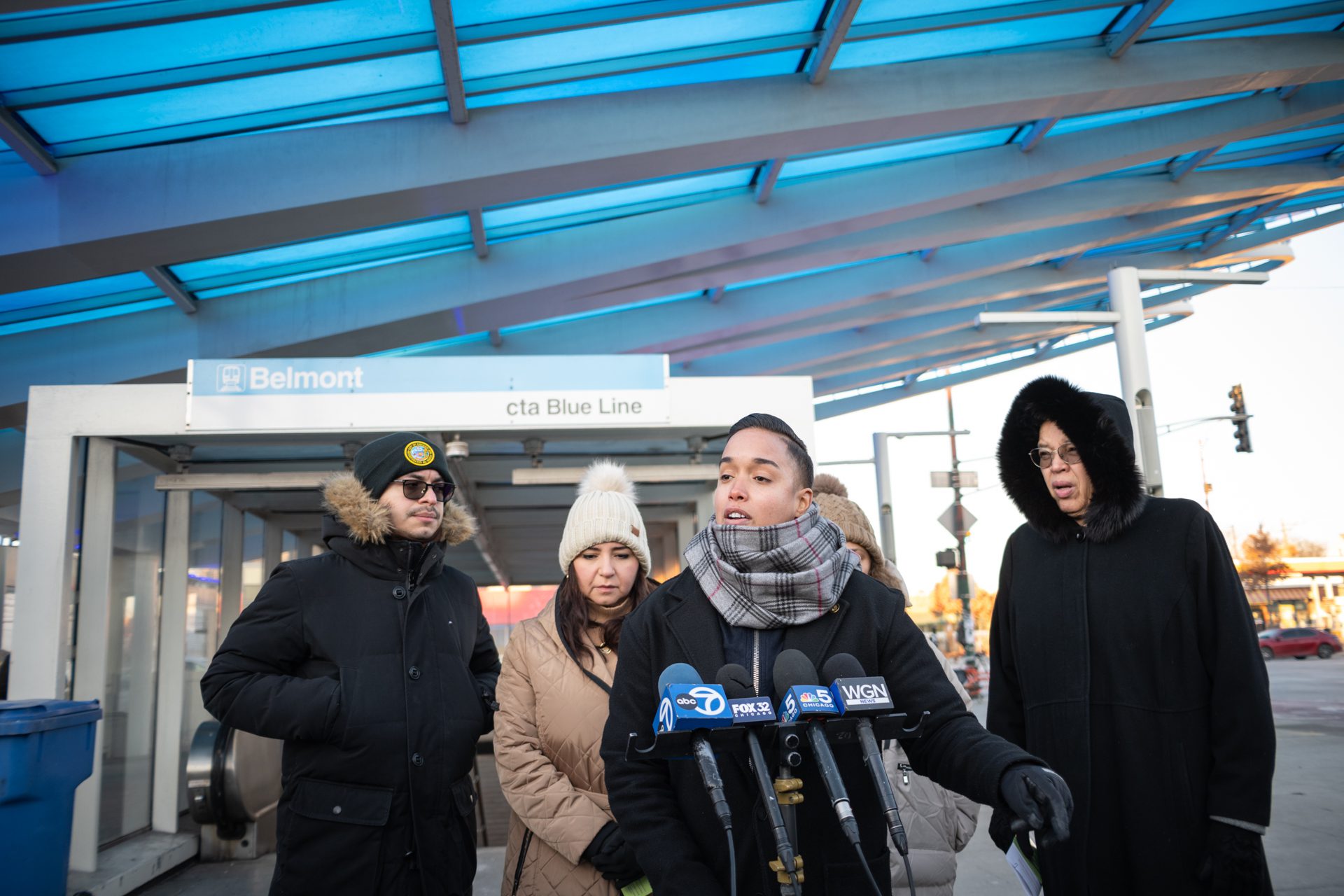
In the last 48 hours, Fuentes has had calls from small businesses, residents and nonimmigrant community residents wanting to know how they can work to protect their neighbors.
From the business community to the school district to elected officials, the city is creating a coalition to protect our immigrants, Fuentes said.
“We should not let fear win in this moment,” Fuentes said. “We want families to know: send your kids to school, you can go to work, you have a community that has your back.”
Contributing reporting from Fatema Hosseini, Katrina Pham and Aydali Campa.
